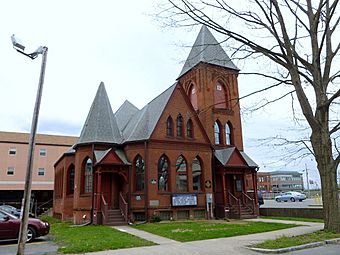French Congregational Church facts for kids
Quick facts for kids |
|
|
French Congregational Church
|
|
 |
|
| Location | Springfield, Massachusetts |
|---|---|
| Built | 1887 |
| Architect | Provost, Sam |
| Architectural style | Gothic |
| MPS | Downtown Springfield MRA |
| NRHP reference No. | 83004288 |
| Added to NRHP | February 24, 1983 |
The French Congregational Church is a very old and special building in Springfield, Massachusetts. It is also known as the First Spiritualist Church since 1919. This church was built a long time ago, in 1887. It was made for French Huguenots, who were a group of Protestants. They worked for a company called Smith & Wesson. The church is listed on the National Register of Historic Places. This means it is an important historical building. In 2016, the church building was moved to a new spot on Union Street. It had to move because a new casino, MGM Springfield, was being built where it used to be.
Contents
About the Church Building
The French Congregational Church is in downtown Springfield. You can find it on Union Street. It is a one-story building. It is made of red bricks. It also has brownstone, which is a type of stone, for decoration.
What the Church Looks Like
The front of the church has a tall, square tower on the right side. This tower has three levels and a pointy roof. On the left side, there is a part that sticks out. It has many sides and a steep roof. In the middle, there is a large, pointy section. It has a steep roof too. This part has three arched windows on the bottom. It also has three arched windows higher up. The main doors are on the sides. They are covered by small, pointy roofs.
Who Built the Church
The church was built in 1887. A person named Samuel Provost designed it. It is a great example of the High Victorian Gothic style. This style uses lots of details and tall, pointed shapes. Daniel Wesson helped pay for the church. He wanted to help the French Huguenot Protestants. Many of them worked at his company, Smith & Wesson.
Changes Over Time
Over the years, fewer people attended the church. So, in 1909, the church building was sold. Different Congregationalist groups used it for a while. In 1911, a local Spiritualist group bought it. They owned it until 2013. In 2016, the whole building was moved. It was a big project to move such an old and large building.
More to Explore
 | Aaron Henry |
 | T. R. M. Howard |
 | Jesse Jackson |



